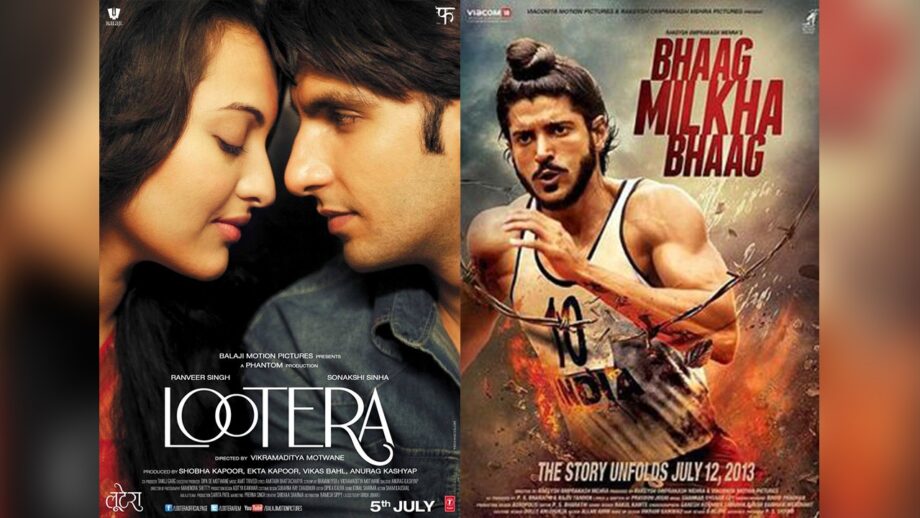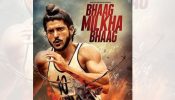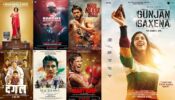Bhaag Milkha Bhaag(2013): History is created in several ways. One of them is cinema. And if Rakeysh Omprakash Mehra’s Bhaag Milkha Bhaag seems like a befitting homage to the flying spirit of India’s greatest runner it is partly because the story, so nimbly woven into a pastiche of drama emotion humour and pathos by Prasoon Joshi, is in no hurry to keep pace with the on-screen Milkha’s breathless sprint.
The story of super-sprinter Milkha Singh unfolds in this exceptional bio-pic at its own volition.There’s no effort here “to tell a story”, to create an impression or to whip up a dramatic storm to captivate audiences.The synergy in the storytelling seems subliminal.
Still, we the audience, fed week after week on mediocrity masquerading as cinema, are riveted to the story Milkha Singh for over 3 hours of playing-time.How come?! Well, to begin with it is Milkha Singh’s own powerful life as India’s superstar sportsperson that sweeps us into the bio-pic. Milkha was so poor he couldn’t afford running shoes, and when he got them he didn’t know how to run in them.When milk was offered in the army in exchange of running practice he grabbed it(the run and the milk) with both hands.
A victim of India’s brutal Partition, Milkha’s story was waiting to be told. Thankfully no one before Rakeysh Omprakash Mehra saw cinematic potential in Milkha’s story.If Milkha’s story had to be told, the storyteller had to be a master craftsman, and one who doesn’t waste space in self-congratulatory flourishes . Rakeysh Ompraksh Mehra reins in the drama .With immense help from Prasoon Joshi, Mehra harnesses Milkha’s life-story into an experience that is Pure Cinema and yet undiluted and uncompromised by the mandatory often silly illogical and idiotic semantics of mainstream commercial cinema.
The absolutely seamless editing (by P. Bharathi) is impressive. The film is very stylishly cut. But not at the cost of losing the saadgi, the innate ascetism of the sportsman-hero. And yes, there are songs, heart-gamboling songs composed by Shankar-Ehsaan-Loy.But they are so effortlessly woven into Milkha’s saga we don’t see them as “song breaks” .We see them as expressions of that innocent joy which springs out of Mehra’s Milkha like milk from a cow’s unconditionally nurturing udder.
And yes, this is as good a time as any to tell you, Farhan Akhtar dances the Bhangra as well as any Punjabi . Actually, he doesn’t dance.He just flows with the rhythm. I’ve never seen any actor dance with such rhapsodic abundance. Neither have I seen any actor run like Farhan.
I don’t know how fast Milka ran. But Farhan’s Milkha doesn’t fake it for even a second. When he runs, he really runs. When he stumbles and takes a fall we flinch and wince in our seats. Method acting? Farhan as Milkha takes us beyond that. His body-language and emotion-expression as Milkha is so pitch-perfect(pun intended) we forget this is not the real Milkha in front of our eyes. Not since Balraj Sahni in Garam Hawa have we seen an actor vanish so effortlessly into his character.This is as real as it gets.
Farhan doesn’t ‘play’ Milkha. The actor occupies Milkha, mind body and soul. There are episodes in this astonishingly well-structured bio-pic where Farhan’s oneness with Milkha equals Ben Kingsley’s empathy with Mahatma Gandhi. In one sequence after a night of binging with a pretty Australian girl (Rebecca Breeds, pretty and amiable) Farhan stands in front of the mirror and slaps himself for messing up on the field . Each slap makes us flinch.These are not faked slaps.Farhan takes Milkha’s pain embarrassment and self-abnegation on his chin.
Mehra’s is not a simple sports-to-glory tale like Chariots Of Fire.This is not just a film about a sportsperson who brought untold glory to our country. As told by Mehra Bhaag Milkha Bhaag is the story of an individual’s journey from nullity to pinnacles of success in a world where politics and violence are constant reminders of how little an individual’s aspirations matter in the larger often murkier scheme .
To compare it with Paan Singh Tomar would be akin to comparing the voices of Lata Mangeshkar and Asha Bhosle.
In Prasoon Joshi’s interpretation of Milkha’s amazing success-story , yearning is the cornerstone to achievement. In 1947 when India became two nations we see little Milkha (Jabtej Singh,endearing) run for his life to escape the savage butchery that snatches away almost his entire family.(Only his dear sister, played wonderfully by Divya Dutt) remains. This is the Sholay massacre without a Gabbar to rationalize the evil.As we see it, Milkha never stopped running since the trauma of Partition.
The ‘run’ as a metaphor of life’s expedient circumstances ,runs through the narrative. Mehra’s storytelling moves into crucial episodes in Milkha’s life unannounced. The brilliant unsparing editor P Bharathi follows no predictable pattern.Yet, the editing is not selfconsciously elusive and mystifying as it was Anurag Basu’s Barfi.
Happily the screen- time is as much taken up with Milkha’s record-breaking achievements on the field, as it is with vignettes from his personal life.There is a robust heartwarming romance between Milkha and the vessel-friendly kudi Biro (Sonam Kapoor, looking prettier than ever) . Writer Joshi and director Mehra invest inexpressible warmth in the protagonist’s courtship scenes.We’ve seen this kind of love blossom on Punjab’s soil before. But it it still feels special and unique.
Farhan does the rest.
He gets tremendous support from other actors, specially Divya Dutta who is incomparably sincere as Milkha’s supportive sister. Don’t miss the sequence between the siblings where Milkha makes his sister wear his sports blazer. It wets eyes while transporting us into the Milkha innerworld.
Pavan Malhotra as Milkha’s coach is as usual, first-rate. Really, this actor should be doing a lot more work! But then, Indian filmmakers seldom have the vision and insight that Mehra invests into almost every moment of this unforgettable tale. There are no exaggerated dramatic flourishes here, no playing to the galleries.Unlike other period films in recent times which have conveniently and lazily resorted to antiques, artifacts and vintage songs , 1950s in Bhaag Milkha Bhaag simply and effortlessly emerges from the character and his milieu.
Binod Pradhan’s camera glides across Milkha’s inner and outer world searching for a meeting point between the two worlds through visuals that suggest a comfortable kinship between feelings and their geopolitical counter-point. We often see Milkha on screen in situations where his emotional world is manifested in the interaction with the people around him.
Binod Pradhan’s cinematography tells it like it is. There is a complex design to the seeming simplicity of this saga of a simple Sikh who would guzzle two cans of ghee on challenge and run to the winning post on feet mauled by jealous rivals.
Who said life could ever be easy for those who aspire to fly higher than the rest? The beautiful irony of Milkha Singh’s life that this consummate bio-pic captures so ably, is that he really didn’t aspire to anything. He ran simply because he had to.
The rest, as they say, is history. Rakeysh Mehra looks at this life of stunning serendipity with tremendous warmth, hope and longing. Bhaag Milkha Bhaag is the kind of cinema that doesn’t tempt us to share the protagonist’s life with any false hopes. We the audience are driven into a desperate urge to share Milkha’s life not only because he ran fast but because he wasn’t afraid to stumble, falter and fall.
Ironically this film on Milkha rarely slips up, if ever.
At one point in an under-punctuated flashback we hear Milkha confide in his sweetheart that he would like the government to declare a national holiday in his honour.
I recommend a national holiday for the entire nation to go and see Run Milkha Run. It makes the other recent high-profile acclaimed films look hopelessly inadequate.
Lootera(2013) : A beautiful but deeply flawed film, Lootera floors you with its audacious sensitivity and its proclivity to use silences to punctuate emotions.Indeed the sequences between Varun and Pakhi, played with compelling intensity by Ranveer Singh and Sonakshi Sinha, bristle and burst at the seams with unspoken feelings. There are long passages of muted lyricism in the narration where silences are used to accentuate the growing passion between a lonely emotionally and sexually insulated daughter of a feudal family in Kolkata, and the attractive stranger who walks into her life with the promise of passion, only to break her heart into wounding shards.
The love story, apparently inspired by an O’Henry short story moves in mysterious magical ways but often tends to lose its way in its search for that elusive horizon where two socially culturally and economically incompatible people in love hanker to unite, but seldom do. Heer Ranjha and Raanhjanaa bear testimony to this.
The film wears two distinctly ‘classic’ looks in sweaty bustling Kolkata and forlorn snowy Dalhousie , both shot with fetching discreetness by cinematographer Mahendra Shetty. The Kolkatan periodicity of the 1950s relies excessively on extraneous props. Putting songs of Geeta Dutt , Mohd Rafi, Hemant Kumar and Lata Mangeshkar of that era in the backdrop is the easiest and laziest way to get the characters to “feel” the bygone era.
I expected Motwane to go futher in his exploration of the theme of repressed love.Motwane takes on the theme of sublime love but seems to pull back at crucial turning-points .When Pakhi’s lover deserts her on their engagement day , I wanted to see Pakhi mourning with her doting father. But no. We only hear her talking about later.Sonakshi’s choked but dignified recrimination recreates unseen moments visually. Yes,her performance is THAT vivid.
The films looks beautiful but comes dangerously close to skipping the soul, but for one clinching factor.Sonakshi Sinha. So far we’ve seen her as a massy queen of blockbusters. Playing the ailing, dying Pakhi in Lootera Sonakshi penetrates her character’s bleeding loneliness with fearless integrity. There are moments, sequences and scattered shots where Sonakshi is captured in various postures of unbearable vulnerability.In a sequence of rebuffed ardour she drops her dignity and drives down to meet the man who suddenly starts avoiding her .
“Will you come tomorrow? Day after? Then the day after that?….” she whispers in declining hope when he refuses her invitation to come home.
It’s a moment of pleading love that reminded me of Shabana Azmi’s celebrated telephonic sequence in Mahesh Bhatt’s Arth. Playing a girl who falls desperately in love with an unworthy man, Sonakshi takes her character through a journey that we see unfold with geographical precision before our eyes.She has great support in creating a memorably tragic character from the film’s crew. She is often captured looking with agonizing vulnerability into a distance where she can see no hope of redemption. It’s a portrait of frightening desolation that reminded me of Shabana Azmi in Mrinal Sen’s Khandhar.
Ranveer Singh , though able and alert in his responses, seems to rely way too much on trying too look vulnerable, charming and rakish.
“You are not Dev Anand,” Varun’s friend(played effectively by Vikrant Massey) tells him sardonically to dissuade Varun from getting close to Pakhi.
That, in essence, is the tragedy underlining the cast factor. The role needed a Dev Anand for us to believe a rich beautifully girl like Pakhi could be completely and irrationally swept off her feet by the unworthy stranger.
The second movement of the plot moves into a moody snowcapped doom. Here, Motwane again makes use of long passages of intense silences to punctuate the feeling of desperate passion.There is also a ‘thriller’ element in the Dalhousie segment of the story that doesn’t quite blend into the finely woven fabric of pain passion and tragedy. The sequences in the isolated snowcapped home between Ranveer and Sonakshi hiss crackle and burn up the screen with their pent-up passion.
Lootera depicts a doomed passion that is at once invigorating and terrifying.Tenderness trickles out of every pore of this beautifully crafted saga of a love so infinite and so forbidden that it seem to scoff at cruel fate and brutal destiny while carving out a craggy jagged path for the lovers . Vikramaditya Motwane’s frames exude a tragic doomed passion. His storytelling is like a coiled twirling stairway to the heart of his irreconcilable protagonists.
The film’s muted silences suggest a deep connectivity between pain and love.
Sadly in the midst all the underlying conflicts poor O’Henry’s story is almost forgotten. O’Henry leaf-leitmotif shyly shows up at the end, making a hasty entry not too convincingly.
Lootera is a flawed gem filled with moments of glorious emotions. The storytelling shows the hands of a masterly visionary who tends to dither in moments of deep drama.
But then there is Sonakshi Sinha who makes you forget all the blemishes in this unforgettable tragedy.












